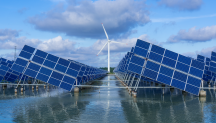

How Corporates are Taking the Lead in Renewable Energy
Newsletter
Over the last few years there has been a significant increase in the voluntary demand for renewable energy sourced by large corporations to supply their own operations and supply chains. As of today, 40% of the Fortune 500 companies have set clean energy targets, over 50 businesses representing a market cap of USD 15 trillion have signed on to the Corporate Renewable Energy Buyers’ Principle and over 83 leading corporations have become part of RE100, a global, collaborative initiative of businesses committed to using 100% renewable electricity.
The subject of the corporate sourcing of renewables — as well as its growing interest — took centre stage at COP22 on Sunday, November 13 in Marrakech, Morocco. Throughout the course of a dedicated session organised by IRENA in collaboration with the Clean Energy Ministerial, RE100 and the World Business Council for Sustainable Development, the potential for corporate sourcing of renewables was further highlighted.
With an increasing number of companies committing to ambitious sustainable energy goals to reduce their carbon footprint, corporate electricity strategies can play an important role in accelerating renewable energy deployment and progress towards global climate objectives. Companies, both large and small, and from diverse business sectors, showcased that they are not only increasingly buying renewable energy, but are looking for ways to share knowledge, experience and best practices so that other companies can learn and ultimately collectively drive renewable energy costs down even further.
The event also served as the kick-off of IRENA's new initiative to assess corporate renewable energy purchases and provide more clarity to consumers to inform choices. The REmade Index will improve knowledge and practices for businesses that want to make renewable energy procurement and purchasing a central part of their operations strategy.
"In the public eye there are many pronouncements but there are no measurements. That accountability will bring great impetus to this initiative," said IRENA Director-General Adnan Z. Amin, who moderated the panel.
The session, featuring representatives from both governments and corporations, focused on the main drivers for corporate demand for cost-competitive renewable energy, its overall potential, and the enabling frameworks needed to support various forms of corporate sourcing of electricity.
"For companies that don’t have the decades of experience we are developing best practices, case studies and white papers in addition to using our collective voice to open up market access since in many instances buyers have no choice about what kind of power they can purchase," said Bill Weihl, Director of Sustainabilty at Facebook.
Importantly, the trend of renewable power purchases is not only happening in the technology sector and in just one market. Major manufacturers around the world are also moving into sourcing significant shares of their power from renewable sources.
"This isn’t just tech companies it is happening in many sectors and globally," added Weihl. "Name a sector you will find a company or a number of companies committing to either 100% renewables or to a path of getting there."
One such company is Dalmia Bharat Cement from India, one of the world's largest cement companies. "Cement is necessary for the buildings sector but emits 5% of the world’s total greenhouse gas emissions," said Mahendra Singhi, CEO of Dalmia Bharat Cement, which announced a new commitment to renewable energy at the Energy Day at COP22. At present, about 7% of the electricity sourced by Dalmia Cement is based on renewable energy but the company is committing to a long term transition to 100% renewable power.
Small and medium size companies are also looking to get into the game and make renewable power purchases.
"This is not just a club for the largest companies, we need to enable SMEs and companies of all scales to source renewable energy," said Simon Currie, Global Head of Energy, Norton Rose Fulbright. "Creating templates, such as for power purchase agreements [PPAs], will help reduce transaction costs."
IRENA and the Coalition for Action are developing the REmade Index to support the Corporate Sourcing of Renewables campaign of the Clean Energy Ministerial. The index will catalogue the companies worldwide that purchase renewables to power their operations.
Visit the Coalition for action website for more information or to learn how to get involved with the REmade Index .




